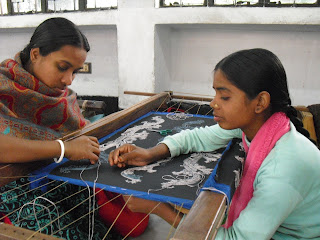There is a difference between traveling to a place and living in one. Traveling allows you to experience the cursory details, to see the sights and cross monuments and museums off a checklist of must-sees. Traveling is wonderful, and I hope to continue to do it throughout my life. I want to see as much of this great big world as possible. But to live, truly live, in a foreign country is a different beast entirely. To meet friends, have "usuals", wave hello to neighbors- these are the things that truly change a person and how he or she views the world. While I've been immensely fortunate to have opportunities to travel, I have never had the chance to truly live in a country other than the United States. Bangladesh provided me the ability to set up roots- however shallow and temporary- in a home far from my own. It is because of this that I have accomplished my goal. I came here with the intent to truly get to know how this place works, what makes it tick, and how to fix it. Maybe my goals were a bit lofty, but I feel as if I have uncovered a secret- these things aren't knowable. As soon as I thought I had Dhaka all figured out, a completely new layer of confusion, frustration, and admiration would show itself like a never ending I-Spy poster.
So maybe that's it. Living in a place that is foreign in every sense of the word gives you the ability to connect with it- but only so much. There will always be secrets to uncover and lessons to learn; and I don't expect to have it all figured out in fourteen weeks. That being said, this has been the most incredible experience of my life to date. I've broken the stereotypes that I held for myself, I did things I never thought I would do, and I met some of the most caring and committed people I can imagine.
Henry Kissinger once described Bangladesh as an "international basket case". In some ways, he is completely right. There are times when I am so sad for this country and how a very few at the top are largely responsible for the misery of tens of millions at the bottom. Without real change in the government, Bangladesh can never fully crawl out of the hole it has dug over the past forty years. However, there is tremendous good being done as well. Aid money is pouring in and myriad development programs are improving the lives of millions of families across the country. Bangladesh is not without friends, and I am confident that sooner or later, the hard work being done by NGOs, aid organizations, and even some in the government, will pay off.
So I am optimistic as I say goodbye to this thumb-print of a country. It has taught me innumerable lessons on Public Health, development, friendship, loyalty, hard work, honesty, gratitude, and so much more. For all of its faults, it has made me better in the truest sense. I only hope that one day I can return the favor.
So maybe that's it. Living in a place that is foreign in every sense of the word gives you the ability to connect with it- but only so much. There will always be secrets to uncover and lessons to learn; and I don't expect to have it all figured out in fourteen weeks. That being said, this has been the most incredible experience of my life to date. I've broken the stereotypes that I held for myself, I did things I never thought I would do, and I met some of the most caring and committed people I can imagine.
Henry Kissinger once described Bangladesh as an "international basket case". In some ways, he is completely right. There are times when I am so sad for this country and how a very few at the top are largely responsible for the misery of tens of millions at the bottom. Without real change in the government, Bangladesh can never fully crawl out of the hole it has dug over the past forty years. However, there is tremendous good being done as well. Aid money is pouring in and myriad development programs are improving the lives of millions of families across the country. Bangladesh is not without friends, and I am confident that sooner or later, the hard work being done by NGOs, aid organizations, and even some in the government, will pay off.
So I am optimistic as I say goodbye to this thumb-print of a country. It has taught me innumerable lessons on Public Health, development, friendship, loyalty, hard work, honesty, gratitude, and so much more. For all of its faults, it has made me better in the truest sense. I only hope that one day I can return the favor.







